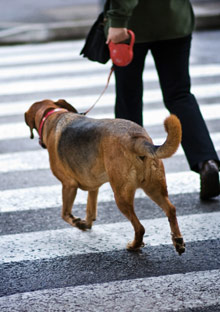I Like My Dog. Yours? Not So Much.

Photo: © 2009 Jupiterimages Corporation
David Rakoff adored his own dog. He just doesn't want to share his Italian pastry with yours.
Manhattan's wealthier citizens had decamped for their summer homes, leaving the rest of us with room to breathe and stroll and enjoy summer in the greatest city in the world. Some friends and I, Italian pastries in hand, parked ourselves on the steps of a brownstone where we observed the passing parade. A perfect New York evening until, coming through the East Village gloaming, he arrived; cunningly small, his coat an unusual, glossy dark gray, almost hematite in color. He playfully sniffed at us, treating us as no more sentient than the stoop upon which we were sitting. It was finally his probing at the wax-papered sfogliatelle in our hands that prompted a response from his owner."Milo!" she said, her voice swoopy with mock scolding. "You know you can't eat sugar."
Milo's infraction, it seems, was strictly personal, dietary, and adorable. There was no "please excuse my dog for nuzzling your food with his nose, a wet appendage that was only moments ago exploring God knows what on the sidewalk and more than likely the backside of some other dog not long before that." The thought probably never even crossed her mind. Indeed, Milo was allowed to continue to tarry, tangled among our ankles (and dessert) as unhurried as a Butoh dancer. It was only when my friend Rory pointed out—with a friendly chuckle, it should be noted—that Milo "might have found the only four New Yorkers who don't love dogs," that his owner pulled her beloved terrier away in protective haste while casting a look in Rory's direction that one might best reserve for the inappropriate slattern who shows up at the Vatican in a tube top with a pentagram Sharpie'd on her stomach.
Lest you think I'm one of those injustice-collecting urban paranoids with a tinfoil hat and a plastic bag containing a brisket and a manifesto in tiny handwriting, a New York crazy who has a problem with everybody and everything, I should mention that I grew up with—and adored—a dog of my very own. A lemon beagle named Hecuba. As channeled by my father—who kept up a running monologue of her voice throughout my childhood—she was less stalwart Queen of Troy than lovable Lucy Ricardo: unfailingly devoted, endearingly clueless (surely every family trip taken without her was nothing more than forgetfulness on our part), and charmingly flatulent. Her death was wrenching, and even now, more than three decades since her passing, when I see a beagle, I melt. I absolutely know and appreciate what it is to love a dog. But I also understand that when I say that Hecuba was the best, the sweetest dog who ever lived, it would never occur to me to expect someone else to feel that way about her. Why, then, am I continuously asked to be an ardent suitor in others' love affairs with their animals? And why does my resistance to do so put me on a continuum of sociopathy somewhere between Bernie Madoff and Hannibal Lecter?
It's the false moral component behind blind animal love that so frosts me. The faulty logic that believes that the capacity to adore a nonhuman creature is somehow a purer form of love. Just try pointing out that a relationship with a creature that cannot challenge you, that does not make you slog daily through the necessary compromise, debate, and occasional pitched battle, might be something less than deep and nuanced, and see where it gets you. By the same token, displays of evident affection on their parts and extraordinary tales of the conscience and loyalty of Balto, for example, or the miraculous intelligence of Alex the African gray notwithstanding, most nonhuman animals don't really feel the same way about us. If they did, you'd overhear a lot more "I'm really pissed off at what you said before about me getting fat and how Alice Munro writes the same book over and over. So no, I don't want to get the ball" in the nation's dog runs.



